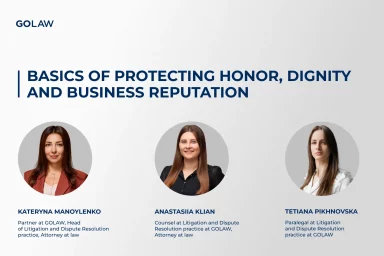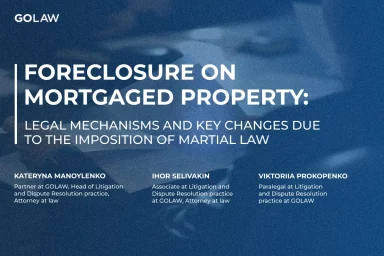De-Reservation of Employees: What Employers Need to Know?
Contents
Recently, information regarding the de-reservation of employees or limiting the deferral until August 07, 2025 has been actively circulating online. But does this affect all individuals liable for military service, and what should employers do in the event of a reservation cancellation? Let’s break it down.
The relevant changes concern those employees who were reserved by the Resolution of the Cabinet of Ministers of Ukraine “On Approval of the Procedure for Reserving Persons Liable for Military Service by State Authorities, Other State Bodies, Local Self-Government Bodies, and Enterprises, Institutions and Organizations During Mobilization and Martial Law” dated February 4, 2015, No. 45 (hereinafter – Resolution No. 45). However, Resolution No. 45 is classified as “For Official Use Only”, that is its content is not freely available.
Who Is Covered by the Reservation Under Resolution No. 45?
Resolution No. 45, commonly referred to as the Procedure for Reserving Persons Liable for Military Service, governs the deferral from mobilization for certain categories of employees working at enterprises and organizations.
Under Resolution No. 45 persons liable to military service are reserved if they are employed:
- by state authorities, other state bodies or local self-government bodies;
- at enterprises, institutions and organizations assigned mobilization tasks (orders).
In 2025 amendments were introduced to Resolution No. 45, reducing or cancelling mobilization tasks for certain enterprises. As a result, the reservation of some employees was annulled. This places employers in a position where response measures must be taken to preserve the company’s workforce capacity.
What Should Enterprises Do If Reservation Under Resolution No. 45 Is Cancelled?
It is important to note that enterprises that previously reserved employees under Resolution No. 45, but after the amendments, do not have such an opportunity, are not prohibited from reserving employees under another Cabinet of Ministers Resolution – Resolution No. 76 dated January 27, 2023, “Certain Issues of Implementing the Provisions of the Law of Ukraine “On Mobilization Training and Mobilization” ” (hereinafter – Resolution No. 76).
The reservation process under Resolution No. 76 typically involves two stages:
- obtaining the status of a critically important enterprise;
- reserving employees.
A company may be granted the status of a critically important enterprise if it meets the criteria defined in Resolution No. 76. The Government has established eight criteria, and in order to obtain the status, the enterprise must meet at least three of them, two of which are mandatory.
First of all, the company must meet two mandatory criteria, namely:
- absence of tax and Unified Social Contribution (USC) arrears;
- the average salary of employees for the last calendar month must be no less than the minimum wage in the country multiplied by a coefficient of 2.5 (as of today – UAH 20 000; however, this requirement does not apply to state- or municipally-owned legal entities, only to the private sector).
In addition to the above, the company must also meet one of the following criteria:
- the total amount of taxes paid during the reporting tax year exceeds the equivalent of EUR 1.5 million;
- the amount of foreign currency inflows, excluding loans and borrowings, during the reporting tax year exceeds the equivalent of EUR 32 million;
- the enterprise is of strategic importance to the state’s economy and security;
- the enterprise is of significant importance to a national economic sector or to meeting the needs of a territorial community (relevant criteria are separately established by executive authorities/military administrations in coordination with the Ministry of Economy and the Ministry of Defense);
- the company is a Diia City resident;
- the company is a mobile operator with an average monthly net income exceeding UAH 200 million, or a fixed-line communication provider with an average monthly net income exceeding UAH 20 million.
If the decision is positive, the enterprise is designated as critically important and automatically receives the ability to reserve (defer) employees through the Diia Portal.
Thus, in case of the cancellation of reservations under Resolution No. 45, the enterprise has the option to apply for employee reservation under Resolution No. 76.
However, it is important to note that the procedure for obtaining the status of a critically important enterprise involves certain requirements and stages. The assessment process and the granting of critical status may take some time, so employers should prepare the necessary documents and an action plan in advance.
Given the complexity of the procedure and the specific requirements, in most cases, the successful recognition of an enterprise as critically important requires the support of qualified legal professionals who can help properly formulate the justification, gather the necessary documents, and minimize the risk of rejection.

Natalia Matviichuk
Senior Associate, Attorney at law
- Contacts
- 31/33 Kniaziv Ostrozkykh St, Zorianyi Business Center, Kyiv, Ukraine, 01010
- n.matviychuk@golaw.ua
- +38 044 581 1220
Get in touch
To get a consultation, please fill out the form below or call us right away:Sign up to be aware
New achievements are inspired by information. GO further, don’t miss out GOLAW news and legal alerts
Our expertise
-
- Energy and Natural Resources
- Antitrust and Competition
- Banking and Finance
- Compliance, Corporate Governance and Risk Management
- Corporate and M&A
- Criminal and White Collar Defence
- Defense in Anti-corruption procedures and regulations
- Labor and Employment
- Natural Resources and Environment
- Government Relations (GR)
- Insolvency and Corporate Recovery
- Intellectual property
- International trade
- Legal support of business and private Сlients in Germany
- Litigation and dispute resolution
- Private clients
- Real Estate and Construction
- Restructuring, Claims and Recoveries
- Martial Law
- Tax and Customs
-
- Agribusiness
- Aviation
- Chemical industry
- Engineering, Construction and Building Materials
- Natural Resources and Environment
- Financial institutions
- IT and AI
- Industry and manufacturing
- Healthcare industries, Life sciences and Pharmaceuticals
- Media, Entertainment, Sports and Gambling
- Retail, FMCG and E-Commerce
- Transport and Logistics
We use cookies to improve performance of our website and your user experience.
Cookies policy
Cookies settings







